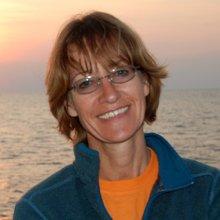
Credit: Florida State University
TALLAHASSEE, Fla. — A Florida State University researcher is part of a multidisciplinary team of scientists that has been awarded a $4 million grant to study the deep-water ecosystems of the Atlantic Ocean.
FSU Associate Research Faculty Sandra Brooke will help lead a diverse company of scientists as they identify the locations of sensitive deep-water habitats and work to ensure their protection from energy industry activities. The project is funded by the Bureau of Ocean Energy Management, with additional support from the National Ocean and Atmospheric Administration and the U.S. Geological Survey.
"I was thrilled when I learned we had won the contract," Brooke said. "It's becoming increasingly difficult to find funding for deep-sea research, and we were competing with some excellent scientists. I'm very much looking forward to exploring new deep-sea habitats and working to understand their distribution, function and how they respond to human activities."
The study, titled "Deepwater Atlantic Habitats II: Atlantic research and exploration in deep water ecosystems with focus on coral, canyon and seep communities," will span more than four years and include extensive field work comprising research cruises, autonomous underwater vehicle surveys and remotely operated vehicle sample collection.
As the project lead for the population and organismal biology section of the study, Brooke will investigate the different ways deep-sea fauna interface with their environments and withstand environmental disruption.
"The Bureau of Ocean Energy Management has a responsibility to locate sensitive habitats within their lease areas," Brooke said. "The overarching objective of our project is to identify these areas and assess their vulnerability to natural and anthropogenic disturbances."
Along with her partners, Brooke will detail the reproductive strategies of bottom-dwelling invertebrates, measure the growth and settlement processes of coral and sponge species, assess the health of mussel populations relative to methane emissions and conduct laboratory experiments on the responses of selected species to a range of environmental conditions.
The project's study region encompasses the area from North Carolina to northern Florida and out to the exclusive economic zone — the stretch of sea extending roughly 200 nautical miles from a state's territorial waters where certain sovereign rights are still reserved. In this delimited region, scientists of various disciplines will explore submarine canyons, ocean-floor methane seeps and deep-water coral communities.
"Our study will explore and characterize the different target habitats, including the oceanography, geology, chemistry and sea-floor and open-water communities associated with them," Brooke said. "Along with NOAA research vessels and remotely operated vehicles, we'll be using additional equipment to collect sediment and water column samples, and benthic landers to deploy instruments on the seafloor to collect long-term environmental data."
The first of three planned research cruises associated with the project is set to embark in September, with two subsequent years of field research scheduled to survey and sample designated study sites.
This project, which follows a similar companion project that studied communities associated with mid-Atlantic submarine canyons, will provide researchers the opportunity to develop a more thorough understanding of these habitats and how best to prevent their degradation.
Brooke expects her research to yield important discoveries about elusive deep-sea habitats that will facilitate broader and more effective conservation efforts.
###
Media Contact
Zachary Boehm
[email protected]
850-645-1504
@floridastate
http://www.fsu.edu
Original Source
http://news.fsu.edu/news/science-technology/2017/07/24/fsu-researcher-help-lead-4m-deep-sea-exploration-study/





